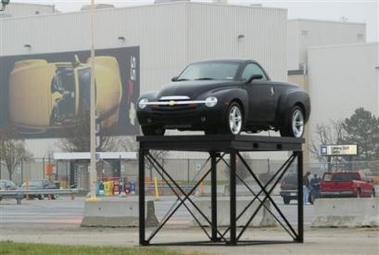More about advocacy and placemaking...
 The General Motors Corp. Lansing Craft Centre is shown Monday, Nov. 21, 2005, in Lansing Township, Mich. GM announced plans to cut 30,000 manufacturing jobs and close nine North American assembly, stamping and powertrain facilities by 2008 as part of an effort to return the company to profitability. The Craft Centre is expected to close in mid-2006. (AP Photo/Al Goldis)
The General Motors Corp. Lansing Craft Centre is shown Monday, Nov. 21, 2005, in Lansing Township, Mich. GM announced plans to cut 30,000 manufacturing jobs and close nine North American assembly, stamping and powertrain facilities by 2008 as part of an effort to return the company to profitability. The Craft Centre is expected to close in mid-2006. (AP Photo/Al Goldis)This started as an email on a local list, in response to one of my postings from last week that started "F*&^ parking..." This entry is slightly edited and expanded.
I am about balance. But car-centricity or automobility isn't about balance, it is about primacy for the car. As long as planning for automobility is primary and most planning decisions yield to car-centricity, you have anything but balance.
The change in the DC DDOT philosophy with the "ascension" of Dan Tangherlini as director is a good thing. It looks for balance. In the old days, most Transportation Department metrics focused on LOS -- levels of service -- for automobiles only. These days, the more enlightened of such agencies across the country focus more on what you might think of as LOQ -- levels of quality -- for all types of mobility (walking, bicycling, transit, personally-driven automobilies, trucks-commercial).
Note that this was reflected in the H Street Transportation and Streetscape Study , as well as the intra-city mobility orientation of the DC Transit Future studies (streetcars and other surface-based transit).
The framework and approach of the the original Transportation-Streetscape Study has merely been reworked into the city's newly titled "Great Streets" program. (Now I think that program is a good thing, but I think that it will have difficulties in succeeding, because they have picked areas that are distressed, and more than merely infrastructure investment is needed--and I don't think that DC Govt. has demonstrated yet that they work very well on the "softer side" of neighborhood revitalization.)
This whole "argument" is related to another thing that I frequently write about--how the dominant planning and land use paradigm in the United States is suburban -- single-use, low density-deconcentrated, and automobile-dependent.
People come to DC imprinted with this paradigm, not recognizing it is a paradigm, and use this anti-urban paradigm to make judgements about how to plan and "use land" in the city.
As long as people are going to advocate for the car without recognizing that they aren't merely calling for "equality" but for dominance, it is incumbent on people like me to take a strident position "from the other side."
Don't think that it is easy. Read my blog entry entitled "Agony of Defeat" for how badly I feel about the future of the ANC6C side of the neighborhood.
When you stake positions along what I think of as the "issue continuum" towards the ideal, you always lose, you just get a lot more than you would have if you had caved early.
This came up with regard to city-wide preservation policy (which is something I am as involved in as ever). I won't get into the nitty-gritty of what happened, but I made this point in regard to "closed door negotiations behind the scenes:"
When you ask for nothing that's exactly what you get. When you ask for the world, you don't get it, but you end up with a lot more of what you asked for--and a lot more than nothing.
Maybe I am a particularly deficient advocate and organizer.
But I also think it has a lot to do with fighting these dominant paradigms and the difficulties it poses, as well as what I think of as a continuing leadership and organizational "deficit" (which is not a term favored by an organization like the Asset-Based Community Development Institute) particularly within the neighborhood, but across the city as well.
A surprisingly "radical" commercial leasing executive once said to me something like "we aren't really fixing the city for the current generation, because they aren't going to change their attitudes and how they perceive land use. We are fixing the city for the next generation, which will grow up and respect urbanity and urbanness."
But if we continue to throw off the lessons of urban design and build car-oriented crap, we will discard any competitive advantage that the city has (well, until we run out of cheap oil and then, speaking of paradigm shift, everything changes...).
In the interim, I will continue to stake out issue positions in concert with urban design and placemaking rather than the alternative. (For sources see "Principles of True Urbanism" Dan Burden's piece on "How Can I Find and Help Build a Walkable Community?" and just about anything on the Project for Public Spaces website, but you can start here "Find a Great Public Place.")



0 Comments:
Post a Comment
<< Home